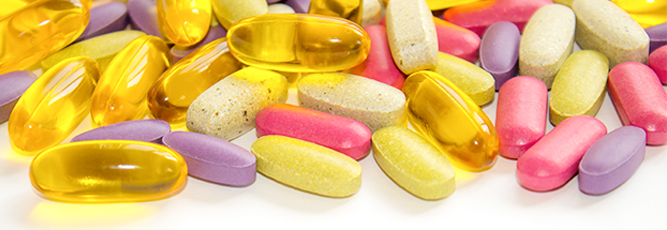Essential nutrients and vitamins play a vital role in healthy pregnancy. You can get all these vitamins and nutrients from the food you eat. However, pregnancy requires you to consume extra amount of vitamins and minerals. These extra vitamins and nutrients are easily available in the markets in the form of supplements.
Sometimes, there might be chances that you may not be able to take in a balanced diet. To compensate the same you need to eat vitamin supplements so that your baby’s health is not compromised. Always remember that supplements can never replace a healthy balanced diet, therefore, you should always consult your health care provider before consuming them.
Let’s discuss in detail a few vitamins and minerals and their role during pregnancy
-
- Zinc: You can find zinc in red meat, poultry, grains, and milk and milk products. Zinc is essential for the production of insulin in the body. 11-12 mg of zinc is recommended for a healthy pregnancy.
-
- Protein: Legumes, beans are the main sources of protein. Poultry, eggs and dairy products are healthy protein sources. Protein produces amino acids, which is necessary for production of new cells. An intake of 71g of protein is recommended during pregnancy.
-
- Calcium: Milk, yogurt, cheese, juices, breads and green leafy vegetables are essential sources of calcium. Calcium is very much essential for the production of healthy bones and teeth. Also, it makes muscles healthy. 1000-1300 mg of calcium intake is recommended during pregnancy.
-
- Iron: Dry fruits, spinach and green leafy vegetables, oatmeal are a few foods rich in iron. Iron is essential for the production of red blood cells, which is further necessary to prevent premature delivery and anemia. 27mg of iron is recommended during pregnancy.
-
- Folic acid: Orange and orange juice, strawberry, spinach and other green leafy vegetables, beans and nuts are rich sources of folate. Folate is very essential for preventing brain defects in the baby. Intake of 600mg of folate is required during pregnancy.
-
- Vitamin A: Carrots, spinach, yellow vegetables are the food sources rich in vitamin A. The vitamin is required for the growth of bones and teeth. 770 mcg of vitamin A is recommended during pregnancy.
-
- Vitamin D: Fish, Sunlight, milk and milk products are the most common sources of vitamin D. Along with calcium and phosphorous vitamin D is responsible for building up of strong teeth and bones.5 mcg of vitamin D a day is necessary for healthy bones and teeth.
-
- Vitamin E: Vegetable oil is the richest source of vitamin E. Few other food sources may include cereals, and spinach. 15 mg of vitamin E intake daily is essential for the formation of red blood cells.
-
- Vitamin C: Citrus fruits, papaya, broccoli are a few sources rich in Vitamin C. The vitamin is an antioxidant, which prevents the body from infection by maintaining a healthy immune system. 80-85 mg of vitamin C is essential for a healthy pregnancy.
-
- Vitamin B1 (Thiamine): Wheat, cereals, eggs, pasta are rich thiamine sources. Thiamine controls the nervous system by increasing the level of energy. 1.4 mg of thiamine per day is essential during pregnancy.
-
- Vitamin B2 (Riboflavin): Milk and milk products, meat, fish are the riboflavin sources. The vitamin is necessary for healthy skin and eyesight. 1.4 mg of vitamin B2 everyday is recommended during pregnancy.
-
- Vitamin B3 (Niacin): Peanuts, fish, meat and bread are rich sources of niacin. Niacin promotes healthy skin, digestion and nervous system. 18mg of niacin is recommended during pregnancy.
-
- Vitamin B6 (Pyridoxine): Chicken, fish, liver, pork and eggs are a few vitamin B6 rich sources. The vitamin relieves morning sickness during pregnancy. 1.9 mg of vitamin B6 is recommended during pregnancy.
All the above nutrients and vitamins should be taken through a balanced diet and if diet is lacking in these nutrients then through supplements.

